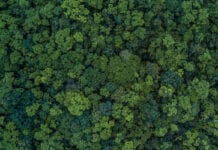
Six research teams across the UK will develop new tools and approaches which will help trees and woodlands adapt to climate change and enable the UK to reach net zero greenhouse gas emissions, it was announced in early August.
The research also aims to improve understanding of the value of trees to people and the planet, and support the expansion of treescapes across the UK.
The projects will receive a share of £10.5 million funding from UK Research and Innovation to:
- Understand how local authorities are meeting their tree planting targets, the cultural significance of trees to communities and how well they capture greenhouse gases
- Work creatively with young people to co-produce new approaches to caring for treescapes that benefit the environment and society
- Investigate how trees respond to stress and pass on that memory to future generations
- Assess the potential of woodland restoration along over 200,000 km of England’s rivers and bodies of water
- Examine how community forests enable stakeholders to work in partnership to deliver multiple benefits from forests
- Study whether trees can adapt effectively to climate change, pests and diseases
Trees, woodlands and forests play a vital role removing greenhouse gases from the atmosphere and nurturing biodiversity. Thirteen per cent of the UK* is covered by woodland, and the UK government has pledged to plant millions of trees every year over the coming decades.
“Expanding the UK’s trees, woodlands and forests will play an important role in realising the government’s ambition to achieve net-zero greenhouse gas emissions by 2050,” says a government press release. “However, our treescapes need to become more resilient to pressures such as changing climate, disease, and competing demands for land in order to reverse decades of decline in biodiversity and environmental quality.”
This November, the UK government will host the COP26 climate negotiations in Glasgow where countries will be expected to set out their plans for reaching net zero by 2050. The Future of UK Treescapes programme will contribute evidence to help policymakers and land managers expand our treescapes and reach this target.
Involving multi-disciplinary teams from thirteen universities and research institutes, over 40 non-academic partners and supporters, and with funding for three years, this funding forms part of the £14.5 million Future of UK Treescapes Programme, involving:
- Natural Environmental Research Council (NERC)
- Arts and Humanities Research Council (AHRC)
- Economic and Social Research Council (ESRC)
- the Department for Food, Environment and Rural Affairs (Defra)
- Welsh Government
- Scottish Government
- Forestry Commission
Forestry Minister Lord Zac Goldsmith said: “In the run up to COP26 this is an exciting opportunity to showcase how the UK’s cutting-edge science can deepen our understanding of the health and environmental benefits provided by trees while ensuring they are protected for future generations.”
Professor Sir Duncan Wingham, Executive Chair of NERC, part of UK Research and Innovation, said: “Our trees and forests are a precious resource and part of the solution to tackling the climate and ecological emergencies we face and helping the UK reach net zero in 2050.
“This research will increase our understanding of the huge societal, economic, cultural and environmental benefits associated with treescapes. This includes the importance of trees in urban spaces, why we connect with forests, and how we encourage landowners and farmers to plant more trees.
“This knowledge will help us identify where and how we can expand our woodlands and ensure their resilience to pressures and stresses over decades and centuries.
The six projects are led by the University of York, Manchester Metropolitan University, Loughborough University, the University of Birmingham, the University of Manchester and the UK Centre for Ecology & Hydrology.







